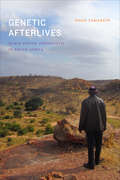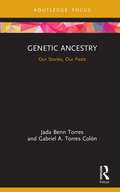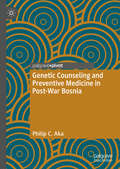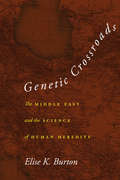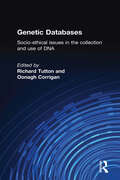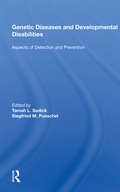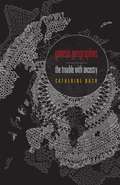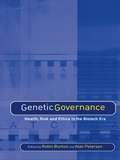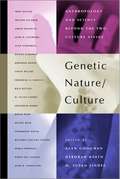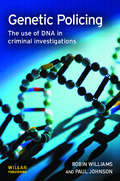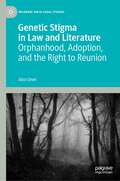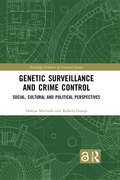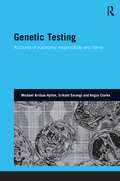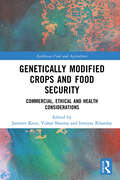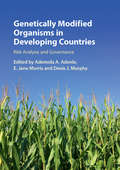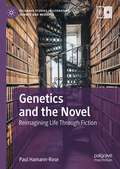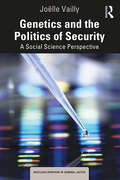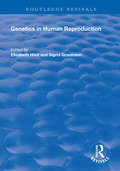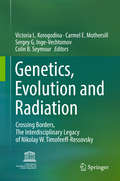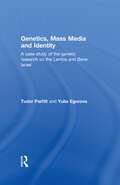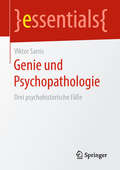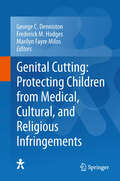- Table View
- List View
Genesis: Genesis, Faces And Masks, And Century Of The Wind (Memory of Fire #1)
by Eduardo Galeano&“An epic work of literary creation . . . There could be no greater vindication of the wonders of the lands and people of Latin America than Memory of Fire.&” —The Washington PostEduardo Galeano&’s monumental three-volume retelling of the history of the New World begins with Genesis, a vast chain of legends sweeping from the birth of creation to the era of savage colonialism. Through lyrical prose and deep understanding, Galeano (author of the celebrated Open Veins of Latin America) recounts creation myths, pre-Columbian societies, and the brutality of conquest, from the Andes to the Great Plains.Galeano&’s project to restore to history &“breath, liberty, and the word&” unfolds as a unique, powerful work of literature. This daring masterpiece sets the past free, weaving a new kind of history from mythology, silenced voices, and the clash of worlds. Genesis is the first book of the Memory of Fire trilogy, which continues with Faces and Masks and Century of the Wind.
Genetic Afterlives: Black Jewish Indigeneity in South Africa (Theory in Forms)
by Noah TamarkinIn 1997, M. E. R. Mathivha, an elder of the black Jewish Lemba people of South Africa, announced to the Lemba Cultural Association that a recent DNA study substantiated their ancestral connections to Jews. Lemba people subsequently leveraged their genetic test results to seek recognition from the post-apartheid government as indigenous Africans with rights to traditional leadership and land, retheorizing genetic ancestry in the process. In Genetic Afterlives, Noah Tamarkin illustrates how Lemba people give their own meanings to the results of DNA tests and employ them to manage competing claims of Jewish ethnic and religious identity, African indigeneity, and South African citizenship. Tamarkin turns away from genetics researchers' results that defined a single story of Lemba peoples' “true” origins and toward Lemba understandings of their own genealogy as multivalent. Guided by Lemba people’s negotiations of their belonging as diasporic Jews, South African citizens, and indigenous Africans, Tamarkin considers new ways to think about belonging that can acknowledge the importance of historical and sacred ties to land without valorizing autochthony, borders, or other technologies of exclusion.
Genetic Ancestry: Our Stories, Our Pasts (New Biological Anthropology)
by Jada Benn Torres Gabriel A. Torres ColónGenetic Ancestry focuses on the scientific nature and limitations of genetic ancestry testing. Co-authored by a genetic anthropologist and a cultural anthropologist, it examines the social, historical, and cultural dimensions of how people interpret genetic ancestry data. Utilizing examples from popular culture around the world and case studies from the Caribbean, the chapters highlight how genetic technology can sometimes bolster racial thinking and serve as tool of resistance and social justice.
Genetic Counseling and Preventive Medicine in Post-War Bosnia
by Philip C. AkaGenetic Counseling and Preventive Medicine in Post-War Bosnia offers a unique new perspective to longstanding debates on healthcare reforms in Bosnia. In this penetrating analysis, Philip C. Aka argues that twenty-five years after the ethnic war that shook Bosnia and Herzegovina to its foundations, healthcare reforms are a function of preventive medicine, defined as genetic counselling, backed by tobacco and alcohol control. At its core, the book offers a fresh examination of healthcare reforms in Bosnia set in the multidisciplinary field of bioethics, supplemented by comparative health studies, and comparative human rights. By offering an extensive list of electronically accessible literature on healthcare accessible in the public domain, Aka delivers an exemplar of research possibilities in the Information Age.
Genetic Crossroads: The Middle East and the Science of Human Heredity
by Elise K. BurtonThe Middle East plays a major role in the history of genetic science. Early in the twentieth century, technological breakthroughs in human genetics coincided with the birth of modern Middle Eastern nation-states, who proclaimed that the region's ancient history—as a cradle of civilizations and crossroads of humankind—was preserved in the bones and blood of their citizens. Using letters and publications from the 1920s to the present, Elise K. Burton follows the field expeditions and hospital surveys that scrutinized the bodies of tribal nomads and religious minorities. These studies, geneticists claim, not only detect the living descendants of biblical civilizations but also reveal the deeper past of human evolution. Genetic Crossroads is an unprecedented history of human genetics in the Middle East, from its roots in colonial anthropology and medicine to recent genome sequencing projects. It illuminates how scientists from Turkey to Yemen, Egypt to Iran, transformed genetic data into territorial claims and national origin myths. Burton shows why such nationalist appropriations of genetics are not local or temporary aberrations, but rather the enduring foundations of international scientific interest in Middle Eastern populations to this day.
Genetic Databases: Socio-Ethical Issues in the Collection and Use of DNA
by Richard Tutton Oonagh CorriganGenetic Databases offers a timely analysis of the underlying tensions, contradictions and limitations of the current regulatory frameworks for, and policy debates about, genetic databases. Drawing on original empirical research and theoretical debates in the fields of sociology, anthropology and legal studies, the contributors to this book challenge the prevailing orthodoxy of informed consent and explore the relationship between personal privacy and the public good. They also consider the multiple meanings attached to human tissue and the role of public consultations and commercial involvement in the creation and use of genetic databases. The authors argue that policy and regulatory frameworks produce a representation of participation that is often at odds with the experiences and understandings of those taking part. The findings present a serious challenge for public policy to provide mechanisms to safeguard the welfare of individuals participating in genetic databases.
Genetic Diseases And Development Disabilities: Aspects Of Detection And Prevention
by Tamah L SadickAdvances in medical genetics during the past two decades have made possible the detection and prevention of many genetic disorders and developmental disabilities. The emphasis of this book is on the application of these new developments to real-life situations. Covering homozygote newborn screening, heterozygote detection in the community, and pren
Genetic Geographies: The Trouble with Ancestry
by Catherine NashWhat might be wrong with genetic accounts of personal or shared ancestry and origins? Genetic studies are often presented as valuable ways of understanding where we come from and how people are related. In Genetic Geographies, Catherine Nash pursues their troubling implications for our perception of sexual and national, as well as racial, difference. Bringing an incisive geographical focus to bear on new genetic histories and genetic genealogy, Nash explores the making of ideas of genetic ancestry, indigeneity, and origins; the global human family; and national genetic heritage. In particular, she engages with the science, culture, and commerce of ancestry in the United States and the United Kingdom, including National Geographic&’s Genographic Project and the People of the British Isles project. Tracing the tensions and contradictions between the emphasis on human genetic similarity and shared ancestry, and the attention given to distinctive patterns of relatedness and different ancestral origins, Nash challenges the assumption that the concepts of shared ancestry are necessarily progressive. She extends this scrutiny to claims about the &“natural&” differences between the sexes and the &“nature&” of reproduction in studies of the geography of human genetic variation.Through its focus on sex, nation, and race, and its novel spatial lens, Genetic Geographies provides a timely critical guide to what happens when genetic science maps relatedness.
Genetic Governance: Health, Risk and Ethics in a Biotech Era
by Alan Petersen Robin BuntonEthical and practical issues around genetic research are of major international concern, both in academia and in the public domain. Questions concerning what interventions are possible and appropriate with the increasing amount of genetic information available, challenge our understandings of ourselves, our health and wellbeing, and the role of medical ethics, public health, surveillance and risk. However there has been little reflection on the socio-political effects of this new genetic knowledge and the changes in practice that are currently impacting on our lives.Containing contributions from key international researchers, this book examines the broader issues of genetic debates and looks at how prediction and risk assessment is being changed in the arenas of health, medicine and reproduction, bringing new insight on the dangers of surveillance, regulation and increased inequality. Developed out of the Taylor and Francis journal Critical Public Health, the book considers the implications of developments in genetics for contemporary liberal governance, as well as for the future of healthcare and public health.
Genetic Nature / Culture: Anthropology and Science Beyond the Two-Culture Divide
by Alan H. Goodman Deborah Heath M. Susan LindeeThis volume of original scholarship focuses on how anthropology is affected by and should respond to the wide range of issues associated with the culture and practice of genetics.
Genetic Policing: The Uses of DNA in Police Investigations
by Paul Johnson Robin WilliamsThis book is about the increasing significance of DNA profiling for crime investigation in modern society. It focuses on developments in the UK as the world-leader in the development and application of forensic DNA technology and in the construction of DNA databases as an essential element in the successful use of DNA for forensic purposes. The book uses data collected during the course of Wellcome Trust funded research into police uses of the UK National DNA Database (NDNAD) to describe the relationship between scientific knowledge and police investigations. It is illustrated throughout by reference to some of the major UK criminal cases in which DNA evidence has been presented and contested.
Genetic Stigma in Law and Literature: Orphanhood, Adoption, and the Right to Reunion (Palgrave Socio-Legal Studies)
by Alice DiverThis book critically analyses the way in which traditional sociocultural and legal biases might be perpetuated against those with unknown – or unknowable – genetic ancestries. It looks to law and works of literature across differing eras and genres focussing upon such concepts as inherited stigma, illegitimacy, orphanisation, adoption, othering, reunion, and the ‘right’ to access truths that relate to one’s original identity. Law’s role in such matters is often limited (or usurped) by custom, practice, or lingering superstitious beliefs; the importance of oral and written testimony is therefore highlighted. Characters include abandoned or orphaned figures from folk and fairy tales, Romantic and Victorian monsters and heroes, Dickensian waifs, Edwardian rescue orphans, and dystopia-set ‘rebels.‘ Their insights and experiences are mirrored in various present day scenarios that speak to familial human rights abuses, not least forced adoptions and bars on accessing original information. This cross-disciplinary book drawing on Law, Literature, Sociology, Critical Adoption Studies should be of interest to those interested in and those who have been affected in some way by adoption, origin deprivation, or reunion.
Genetic Surveillance and Crime Control: Social, Cultural and Political Perspectives (Routledge Frontiers of Criminal Justice)
by Helena Machado Rafaela GranjaGenetic Surveillance and Crime Control presents a new empirical and conceptual framework for understanding trends of genetic surveillance in different countries in Europe and in other jurisdictions around the world. The use of DNA or genome for state-level surveillance for crime governance is becoming the norm in democratic societies. In the post-DNA, contemporary modes of criminal identification are gradually changing through the increasing expansion of transnational sharing of DNA data, along with the development of highly controversial genetic technologies that pose acute challenges to privacy and generate fears of discrimination, racism and stigmatization. Some questions that guide this book are: How is genetic surveillance in the governance of crime intertwined with society, ethics, culture, and politics? What are the views and expectations of diverse stakeholders –scientists, police agencies, and non-governmental organizations? How can social sciences research about genetic surveillance accommodate socio-cultural and historical differences, and be sensitive to specificities of post-authoritarian societies in Europe? Taking an interdisciplinary approach focused on challenges to genetic privacy, human rights and citizenship in contemporary societies , this book will be of interest to students and scholars of social studies of science and technology, sociology, criminology, law and policing, international relations and forensic sciences.
Genetic Testing: Accounts of Autonomy, Responsibility and Blame (Genetics and Society)
by Srikant Sarangi Michael Arribas-Ayllon Angus ClarkeAdvances in molecular genetics have led to the increasing availability of genetic testing for a variety of inherited disorders. While this new knowledge presents many obvious health benefits to prospective individuals and their families it also raises complex ethical and moral dilemmas for families as well as genetic professionals. This book explores the ways in which genetic testing generates not only probabilities of potential futures, but also enjoys new forms of social, individual and professional responsibility. Concerns about confidentiality and informed consent involving children, the assessment of competence and maturity, the ability to engage in shared decision-making through acts of disclosure and choice, are just some of the issues that are examined in detail.
Genetically Modified Crops and Food Security: Commercial, Ethical and Health Considerations (Earthscan Food and Agriculture)
by Vishal Sharma Jasmeet Kour Imtiyaz KhandayThis book reviews a wide-range of genetically modified (GM) crops to understand how they are produced, the impacts on the agricultural industry, and their potential for improving food security. The production of GM crops has now become an invaluable asset in the agricultural toolbox. With a significant portion of the world suffering from hunger and poverty, this book examines how food security can be achieved through GM crops. A wide variety of crops are examined, from the earliest developments of GM tomatoes and potatoes to recent interest in the development of low-cost, high yielding biofuels, such as microalgae. Chapters also discuss the role of GM crops in pest management and the consequential reduction in the use of insecticides. Overall, this book provides an important synthesis of GM crops from their commercial value to the agricultural industry, as well as their potential for improving food security. This book will be of great interest to students and scholars of agricultural engineering, crop science, food biotechology, food security, and those interested in food and agriculture and sustainable development more broadly.
Genetically Modified Organisms in Developing Countries: Risk Analysis and Governance
by Murphy Morris Adenle Ademola A. E. Jane Denis J."Bringing together the ideas of experts from around the world, this incisive text offers cutting-edge perspectives on the risk analysis and governance of genetically modified organisms (GMOs), supporting effective and informed decision-making in developing countries. Comprised of four comprehensive sections, this book covers: Integrated risk analysis and decision making, giving an overview of the science involved and examining risk analysis methods that impact decision-making on the release of GMOs, particularly in developing countries. Diversification of expertise involved in risk analysis and practical ways in which the lack of expertise in developing countries can be overcome. Risk analysis based regulatory systems and how they can be undermined by power relationships and socio-political interests, as well as strategies for improving GMO policy development and regulatory decision-making. Case studies from developing countries providing lessons based on real-world experience that can inform our current thinking"--Provided by publisher.
Genetics and the Novel: Reimagining Life Through Fiction (Palgrave Studies in Literature, Science and Medicine)
by Paul Hamann-RoseGenetics and the Novel: Reimagining Life Through Fiction argues that literary fiction has reimagined life in the age of genetics. The new genetic paradigm has proposed to rewrite core assumptions about such fundamental aspects of life as the nature of kinship and biological connection, human-environmental relations, or the link between biology and art. Investigating major texts of genetic fiction by A. S. Byatt, Ian McEwan, Simon Mawer and Margaret Atwood, this monograph offers the first systematic study of how these assumptions about life itself have been renegotiated through the contemporary novel’s engagement with genetic science. This book identifies a significant new phase in the novel’s aesthetic exploration of life and demonstrates that the novel emerges as the cultural form uniquely positioned to engage both the imaginative and concrete challenges raised by genetic science for the lifeworlds of the new millennium.
Genetics and the Politics of Security: A Social Science Perspective (Routledge Frontiers of Criminal Justice)
by Joëlle VaillyPresenting a social science perspective on the contemporary gaze on the body of the suspect, this book considers how definitions of criminality, offenses, individual rights, and the concepts of identity and difference have been altered by changes in the biological status of the human.Spurred by rapid developments in genetics and information technology, a number of countries, including France, the United States, the United Kingdom, China, and the Netherlands, have considerably expanded their genetic databases used by the police and the criminal justice system. Whilst this makes it possible to compare DNA left at the scene of a crime with that of an individual known to the police, helping to identify individuals for the purposes of court proceedings, these innovations also raise a number of important questions, such as how the relationship between respect for the rights of individuals and the security of populations is discussed, as well as for how long this data should be retained. Genetic analysis also raises concerns related to phenotyping and “biogeographical origin” that could lead to the stigmatization of targeted groups.Offering a comprehensively argued view on how DNA acts not only as a tracker of suspicion but also as a marker of contemporary social developments, Genetics and the Politics of Security will appeal to students and scholars, judiciary personnel, lawyers, police officers, and people with an interest in criminology and the use of genetics in the criminal justice process.
Genetics in Human Reproduction (Routledge Revivals)
by Elisabeth Hildt Sigrid GraumannPublished in 1999, this book discusses issues related to the current and possible future technological progress in genetic technology linked to in vitro fertilization, specifically preimplantation diagnosis and germline gene therapy, from a scientific and medical as well as from a social, juridical and ethical point of view. The 31 contributions are divided into six sections medical and scientific view, personal interests and moral implications, moral rights and duties, social concepts and moral implications, choices and decision making, and justice in health care and legal regulation.
Genetics, Evolution and Radiation
by Victoria L. Korogodina Carmel E Mothersill Colin B. Seymour Sergey G. Inge-VechtomovThis book is dedicated to the great scientist and outstanding individual Nikolay Wladimirovich Timofeeff-Ressovsky. The book brings together a number of brief stories/essays about Timofeeff-Ressovsky including "Stories told by himself", and scientific chapters addressing his major research areas: genetics, radiobiology, radiation ecology and epidemiology, and evolution. Timofeeff-Ressovsky contributed to several fields of biology and established new directions of scientific research. He often repeated the phrase, which would later become famous: "Science should not be approached with the ferocity of wild animals". In keeping with that philosophy, the issues discussed here are still open. Each scientific part starts with a current review; the chapters present leading scientific schools and views. The main theme discussed in the genetics part is mutation variability in the context of linear (replication, transcription, translation) and conformational template processes, and its dependence on phylogenetic group. In turn, the radiobiology chapters focus on the reorganization of DNA, cell, and population variability under low-dose irradiation, sparking indirect processes and adaptive response. The radiation ecology and epidemiology parts present data on the consequences of nuclear plants and related accidents for ecological systems and human beings. Here some approaches to estimating radiation risks are also offered. Evolution laws are demonstrated in the genomic universe, plant-microbe symbiosis, stabilizing and destabilizing (directional) selection. The last essay demonstrates the principles of organization operating in local animal populations, which are approached as social organisms of complex systemic nature. The chapter 'Radiation-Induced Aging and Genetic Instability of Mesenchymal Stem Cells: An Issue for Late Health Effects?' is available open access under a CC BY 4. 0 license. >
Genetics, Mass Media and Identity: A Case Study of the Genetic Research on the Lemba
by Tudor Parfitt Yulia EgorovaThis is the first book to explore the effect of genetic research on the Lemba Judaising community of Southern Africa and the phenomenon of Israelite identity. The science of genetics as relayed by the media is perceived by laymen as being irreproachably objective 'hard science': its disinterested 'scientific' findings appear immensely impressive and may therefore act as a powerful catalyst for change. In this case, an oral tradition cherished by many of the Lemba that they are of Jewish origin appears to be supported by recent DNA testing, which has deeply affected the narrative and religious identity of the group and the way the tribe is perceived in the Western world. International in appeal, this topical text brings together cutting-edge research on the social, cultural and ethical implications of genetics and the study of Judaising movements across the world. This book will be of interest to researchers and students of Jewish history, genetic anthropology, race and ethnicity studies, and religious and cultural studies.
Geniale Frauen in der Wissenschaft: Versteckte Beiträge, die die Welt verändert haben
by Lars JaegerObwohl Frauen schon früh das wissenschaftliche Denken mitgeprägt haben, sichtbar geworden sind sie fast nie. Dieses Ungleichgewicht setzt sich bis heute fort, auch wenn es aktuell weit mehr Wissenschaftlerinnen gibt als jemals zuvor. Lars Jaeger spannt einen Bogen von der Antike bis heute und porträtiert in essayartigen Einführungen das Leben und Wirken der wohl bedeutendsten weiblichen Naturwissenschaftlerinnen und Mathematikerinnen. Von Hypatia von Alexandria über Émilie du Châtelet und Emmy Noether bis hin zu Lisa Randall, sie alle haben Großes geleistet, die Wissenschaft entscheidend vorangebracht und konnten dennoch oft nicht aus dem Schatten ihrer männlichen Kollegen treten.Neben den spannenden Porträts der einzelnen Wissenschaftlerinnen sowie einer detaillierten und anschaulichen Darstellung ihrer wissenschaftlichen Leistungen beleuchtet dieses Sachbuch auch das Geschlechterverhältnis in der Wissenschaft, das sich nur quälend langsam zugunsten eines fairen Verhältnisses für die Frauen entwickelt.
Genie und Psychopathologie: Drei psychohistorische Fälle (essentials)
by Viktor SarrisDieses essential behandelt die psychischen Erkrankungen von Robert Schumann, Vincent van Gogh und Virginia Woolf - diesen Genialen der Musik, Malerei und Literatur - aus psychohistorischer Sicht. Es stellt die Frage, wie diese drei gro#65533;en Pers#65533;nlichkeiten mit ihren schweren Depressionen umgegangen sind. Ihr Schicksal ist neben der klinisch-medizinischen Seite auch unter einem psychologischen und anthropologischen Blickwinkel von Interesse. Das Thema wird im Rahmen eines biopsychosozialen Modells im Zusammenhang mit der sogenannten Mad-Genius-Hypothese behandelt. Dabei steht die zu beachtende Problematik einer Stigmatisierung und gesellschaftlichen Ausgrenzung von Genialen und psychisch Labilen bzw. Kranken ebenfalls im Raum.
Genital Cutting: Protecting Children from Medical, Cultural, and Religious Infringements
by Frederick M. Hodges Marilyn Fayre Milos George C. DennistonThis volume contains the proceedings of the 10th International Symposium on Circumcision, Genital Integrity, and Human Rights. Authors are international experts in their fields, and the book contains the most up-to-date information on the issue of genital cutting of infants and children from medical, legal, bioethical, and human rights perspectives.
Genius & Anxiety: How Jews Changed the World, 1847-1947
by Norman LebrechtA unique chronicle of the years 1847-1947, the century when the Jewish people changed the world—and it changed them.In a hundred-year period, a handful of men and women changed the way we see the world. Many of them are well known—Marx, Freud, Proust, Einstein, Kafka. Others have vanished from collective memory despite their enduring importance in our daily lives. Without Karl Landsteiner, for instance, there would be no blood transfusions or major surgery. Without Paul Ehrlich, no chemotherapy. Without Siegfried Marcus, no motor car. Without Rosalind Franklin, genetic science would look very different. Without Fritz Haber, there would not be enough food to sustain life on earth. What do these visionaries have in common? They all had Jewish origins. They all had a gift for thinking in wholly original, even earth-shattering ways. In 1847 the Jewish people made up less than 0.25% of the world&’s population, and yet they saw what others could not. How? Why? Norman Lebrecht has devoted half of his life to pondering and researching the mindset of the Jewish intellectuals, writers, scientists, and thinkers who turned the tides of history and shaped the world today as we know it. In Genius & Anxiety, Lebrecht begins with the Communist Manifesto in 1847 and ends in 1947, when Israel was founded. This robust, magnificent volume, beautifully designed, is an urgent and necessary celebration of Jewish genius and contribution.

